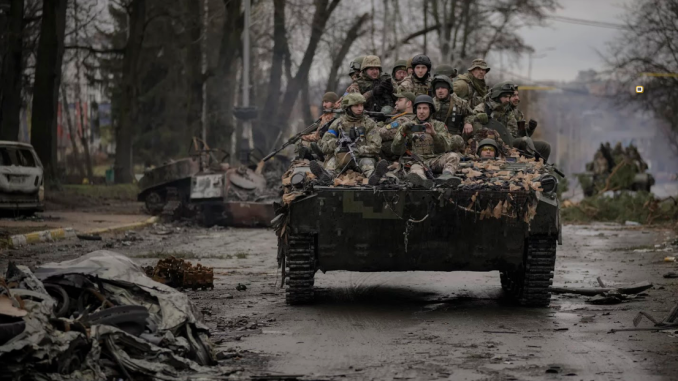
By Ian Ezinga
The other day on Instagram, I saw a story urging Americans to better understand the crisis in Ukraine. The situation on the ground, the story explained, is one where Putin is planning on constructing concentration camps, Russian soldiers are playing games involving hunting children, and that the war is overwhelmingly popular amongst ordinary Russians. While obviously against the war, I am becoming increasingly wary of some of the messaging one can find floating in the news and online. The problem is not bringing awareness about the atrocities of war but framing the conflict in such a way that insists upon further escalation, particularly by the hands of NATO and the United States.
In early March, a guerilla action by several artists filled the floor of New York’s Guggenheim Museum with paper airplanes to signify the need for a no-fly zone over Ukraine. This is just one example of liberally minded individuals, whose hearts are arguably in the right place, expending energy in a completely backward trajectory. A no-fly zone, for those unaware, is a whisper away from a declaration of war; establishing a precedent to shoot down any military aircraft entering said zone and in effect, immediately creating grounds for compounding the scale of the conflict.
Stringently damning the entirety of Russia, calling for a no-fly zone, and unilaterally praising Ukrainian officials we know nothing about, are all avenues for distorting our understanding of the conflict and distancing us from the arrival of a lasting peace. The aggressor is plainly in the wrong, and the horrors brought upon the people of Ukraine are incalculable. But once that conclusion has been reached, the work left to be done should be objective. Do we hate war? If the answer is yes, the goal should be to seek peace as quickly as possible and reach a resolution that has the best chance of sustaining it. All other variables aside, this should remain the focus.
The issue I have with loosely reporting ‘facts’ about the aggressors or needlessly heroizing Ukrainian political figures is that these actions do not work towards the primary objective. Such efforts channel our stagnant energy, constantly excited by new footage and emerging reports, into ideas about how escalation may be the only viable option. This can be seen when White House reporters skip over the fundamental question of if the US should get involved and jump straight into asking at what point they will. The headlines, and the entire profit model of news media, demand drama. It is easier to get traffic on a story or post asking if the US is doing enough to prevent further suffering than to encourage readers to perform a cost-benefit analysis of getting directly involved in a conflict with a hostile nuclear superpower.
It doesn’t take a background in geopolitics or the logistics of military engagement to get the gist that the US or NATO committing more than military equipment and humanitarian aid spells out a conflict much more costly than the one being acted out in the present. Do not mistake the usage of ‘cost-benefit analysis’ as glossing over the loss of human life. The cost I am most concerned with are human lives, and it is why I am generally opposed to the West doing much more than they are right now. In addition to becoming jaded or losing the ability to remain engaged at all, I also fear that the constant stream of updates mixing emotion with both facts and fiction will frivolously kidnap our attention and trap us into limited ways of thinking.
The penalty for staring too long is losing sight of the primary objective–peace–and beginning to see heightened military action as a solution as opposed to something that should be avoided at all costs. Stare away, but be mindful that more than one nuclear superpower occupying the same space doesn’t bode well for the people of Ukraine, let alone the entire world.
